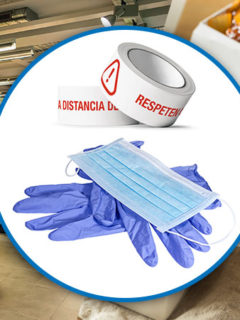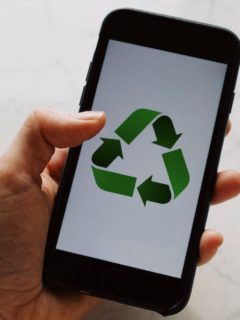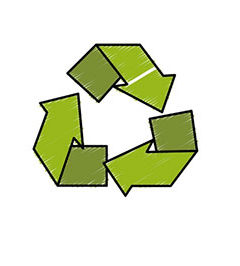Environmental logos are present on many products and packaging, although we are not always aware of their meaning. These symbols reflect the ecological commitments of manufacturers and may indicate recyclability, compostability or the materials used in the product design. From seals that guarantee EcoResponsible manufacturing to those that inform about the end-of-life of packaging, RAJA® invites you to discover the main environmental logos.
Why is it important to know the environmental logos?
Understanding the meaning of these logos is crucial in a context where sustainability is a priority for both companies and consumers.
For companies, these seals are a key reference for choosing EcoResponsible packaging, indicating the origin of materials, their recyclability and sorting instructions. They also certify compliance with ecological commitments.
For consumers, environmental logos facilitate more sustainable purchasing decisions. Environmental awareness is on the rise: a ProCarton study indicates that 52% of shoppers in Europe are looking for products with more environmentally friendly packaging. In addition, these seals help to ensure that packaging is disposed of correctly.
EcoResponsible labels
Behind the environmental logos you need to know about, there are several labels that guarantee the eco-design of packaging.
Official labels
- European Ecolabel: Created in 1992, this is the only official certification valid in all European countries. It guarantees that the product complies with ecological criteria established in Regulation (EC) No 66/2010, ensuring a lower environmental impact throughout its life cycle. Companies must submit their application to AFNOR with evidence of their ecological commitment.
- NF Environment label: Similar to the previous label, but exclusive to France. Created in 1991, it certifies that a product meets strict ecological criteria and fitness for use requirements.
Other EcoResponsible Labels
- FSC (Forest Stewardship Council)Ensures that forest management is sustainable. The certification, awarded by independent bodies, is based on annual audits for five years.
- PEFC (Programme for the Endorsement of Forest Certification Schemes): Guarantees responsible forestry practices, considering social, environmental and economic aspects. It certifies the traceability of the material from the forest to the market.
- OK Compost & OK Compost Home: Certifies compostable products without harmful substances.
- OK Compost: For composting in industrial facilities.
- OK Compost Home: Suitable for home composting.
To obtain certification, products must pass tests for biodegradation, disintegration, ecotoxicity and analysis of heavy metals and fluorine.
Most common environmental logos
Printed on paper and packaging, these logos certify compliance with environmental standards, identify materials and provide information on recyclability and waste sorting.
To learn more about recycling cardboard, paper and plastics, check out our environment and packaging dictionary and become an expert on environmental logos.
 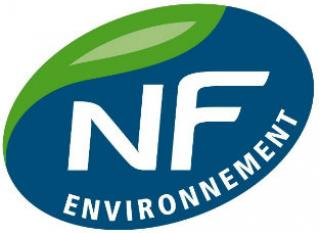 | These two labels, displayed on packaging, ensure that products have a lower environmental impact during their life cycle. |
 | A European eco-label of German origin, the Blue Angel label is awarded to products that, while following a process of reducing harmful effects on the environment during their production, can be considered as reliable, high quality and safe as the rest. The attribution criteria take into account the entire life cycle of the product, from raw material extraction to waste treatment. |
 | RAJA® is a member of FSC® France (Forest Stewardship Council) which promotes the responsible management of forests according to the 3 criteria of sustainable development: social, ecological and economic. |
 | As a member of PEFC France, RAJA® is committed to promoting sustainable forest management. This certification guarantees that the product you buy is made from eco-responsible raw materials, and that with your purchase you are participating in the preservation of forests in France and throughout the world. |
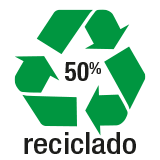 | This acronym indicates that the product is made from recycled materials. The percentage of these recycled materials is indicated on the inside of the loop. |
| This symbol indicates that the product can be included in the selective waste collection as it is one of those classified in waste management. | |
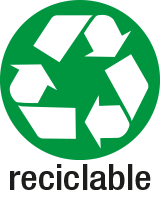 | This symbol indicates that the product is recyclable and can be placed in the yellow bin. |
 | The RESY symbol is issued by a German organisation and can only be placed on cardboard products. It indicates that the cardboard is recyclable. |
 | This OK compost label certifies the biodegradability of the product, 90% in 6 months under industrial composting conditions. |
 | This OK compost home label certifies that the product is compostable under home composting conditions. |
 | This acronym confirms the presence of recyclable aluminium in the product. |
What’s new 2025
On 1 January, a number of new legal obligations related to the marking and labelling of packaging came into force. These rules are derived from Royal Decree 1055/2022 of 27 December on packaging and packaging waste. They aim to improve recycling and reuse and seek to standardise the information that consumers need to deposit packaging waste correctly in containers. They also seek to align labelling obligations with the future provisions of the PPWR, the European Packaging and Packaging Waste Regulation.
Biodegradable packaging contributes to the well-being of the environment. So if you too are concerned about caring for the planet, choose products made from biodegradable materials and make a commitment to a greener, less wasteful future!












